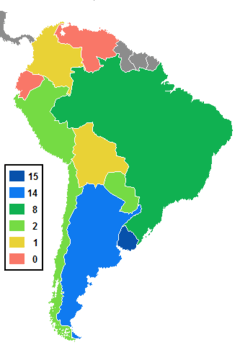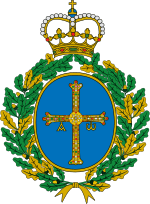Brazil national football team
The Brazil national football team (Portuguese: Seleção Brasileira de Futebol) represents Brazil in men's international football and is administered by the Brazilian Football Confederation (CBF), the governing body for football in Brazil. They have been a member of FIFA since 1923 and a member of CONMEBOL since 1916.
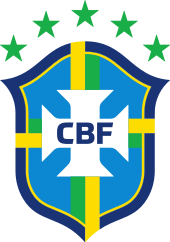 | |||
| Nickname(s) | Seleção (The Select) Canarinha (Little Canary) Verde-Amarela (The Green and Yellow) Esquadrão de Ouro (The Golden Squad) | ||
|---|---|---|---|
| Association | Confederação Brasileira de Futebol (CBF) | ||
| Confederation | CONMEBOL (South America) | ||
| Head coach | Tite[1] | ||
| Captain | Dani Alves[2] | ||
| Most caps | Cafu (142)[3][4] | ||
| Top scorer | Pelé (77)[5] | ||
| Home stadium | Various | ||
| FIFA code | BRA | ||
| |||
| FIFA ranking | |||
| Current | 3 | ||
| Highest | 1 (159 times on 8 occasions[7]) | ||
| Lowest | 22 (6 June 2013) | ||
| First international | |||
(Buenos Aires, Argentina; 20 September 1914)[8] | |||
| Biggest win | |||
(São Paulo, Brazil, 10 April 1949)[9] (Lima, Peru, 24 March 1957) | |||
| Biggest defeat | |||
(Viña del Mar, Chile; 18 September 1920) (Belo Horizonte, Brazil; 8 July 2014) | |||
| World Cup | |||
| Appearances | 21 (first in 1930) | ||
| Best result | Champions (1958, 1962, 1970, 1994, 2002) | ||
| Copa América | |||
| Appearances | 36 (first in 1916) | ||
| Best result | Champions (1919, 1922, 1949, 1989, 1997, 1999, 2004, 2007, 2019) | ||
| Panamerican Championship | |||
| Appearances | 3 (first in 1952) | ||
| Best result | Champions (1952, 1956) | ||
| Confederations Cup | |||
| Appearances | 7 (first in 1997) | ||
| Best result | Champions (1997, 2005, 2009, 2013) | ||
Brazil is the most successful national team in the FIFA World Cup, being crowned winner five times: 1958, 1962, 1970, 1994 and 2002. Brazil also has the best overall performance in the World Cup, both in proportional and absolute terms, with a record of 73 victories in 109 matches played, 124 goal difference, 237 points, and 18 losses.[10][11] Brazil is the only national team to have played in all World Cup editions without any absence nor need for playoffs.[12]
In relation to ranking standings Brazil fare well, having the all-time highest average football Elo rating system since 1970, and the fourth all-time peak football Elo Rating established in 1962. In FIFA's own ranking, Brazil holds the record for most Team of the Year wins with 12.[13] Many commentators, experts and former players have considered the Brazil team of 1970 to be the greatest football team ever.[14][15][16][17][18] Other Brazilian teams are also highly estimated and regularly appear listed among the best teams of all time, such as the Brazil teams of 1958–62, with honorary mentions for the gifted 1982 side.[19][20][21][22]
Brazil is the only national team to have won the World Cup on four different continents: once in Europe (1958 Sweden), once in South America (1962 Chile), twice in North America (1970 Mexico and 1994 United States) and once in Asia (2002 Korea/Japan). They share with France and Argentina the feat to have won the three most important men's football titles recognized by FIFA: the World Cup, the Confederations Cup, and the Olympic tournament.[note 1] They also share with Spain a record of 35 consecutive matches undefeated.[23]
Brazil has many rivals due to its successes, with notable rivalries with Argentina—known as the Superclássico das Américas in Portuguese, Italy—known as the Clásico Mundial in Spanish or the World Derby in English,[24][25] Uruguay due to the traumatic Maracanazo,[26] France (due to the fact that they usually have difficulties against France in World Cups)[27], and Netherlands, due to the several important meetings between the two teams at World Cups, and the style of play of the two teams being considered similar.[28] Brazil has also produced players considered as the best of the world at their time and among the best in history, such are the cases of Pelé (widely regarded as the greatest footballer of all time), Garrincha, Rivellino, Zico, Romário, Cafu, Roberto Carlos, Ronaldo, Rivaldo, Ronaldinho, Kaká and Neymar. A common quip about football is: "Os ingleses o inventaram, os brasileiros o aperfeiçoaram" (The English invented it, the Brazilians perfected it).[29]
History
Early history (1914–22)
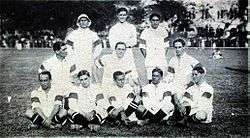
.jpg)
It is generally believed that the inaugural game of the Brazil national football team was a 1914 match between a Rio de Janeiro and São Paulo select team and the English club Exeter City, held in Fluminense's stadium.[30][31] Brazil won 2–0 with goals by Oswaldo Gomes and Osman,[30][31][32] though it is claimed that the match was a 3–3 draw.[33][34]
In contrast to its future success, the national team's early appearances were not brilliant. Other early matches played during that time include several friendly games against Argentina (being defeated 3–0), Chile (first in 1916) and Uruguay (first on 12 July 1916).[35] However, led by the goalscoring abilities of Arthur Friedenreich, they were victorious at home in the South American Championships in 1919, repeating their victory, also at home, in 1922.
First World Cup and title drought (1930–49)
In 1930, Brazil played in the first World Cup, held in Uruguay. The squad defeated Bolivia but lost to Yugoslavia, being eliminated from the competition.[36] They lost in the first round to Spain in 1934 in Italy, but reached the semi-finals in France in 1938, being defeated 2–1 by eventual winners Italy. Brazil were the only South American team to participate in this competition.
The 1949 South American Championship held in Brazil ended a 27-year streak without official titles.[37] The last one had been in the 1922 South American Championship, also played on Brazilian soil.[37]
The 1950 Maracanazo
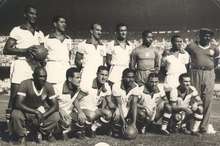
After that, Brazil first achieved international prominence when it hosted the 1950 FIFA World Cup. The team went into the last game of the final round, against Uruguay at Estádio do Maracanã in Rio, needing only a draw to win the World Cup. Uruguay, however, won the match and the Cup in a game known as "the Maracanazo". The match led to a period of national mourning.[38]
For the 1954 World Cup in Switzerland, the Brazilian team was then almost completely renovated, with the team colours changed (to a new design by Aldyr Schlee) from all white to the yellow, blue and green of the national flag, to forget the Maracanazo, but still had a group of star players. Brazil reached the quarter-final, where they were beaten 4–2 by tournament favourites Hungary in one of the ugliest matches in football history, known as the Battle of Berne.[39]
The Golden Era with Pelé (1958–70)
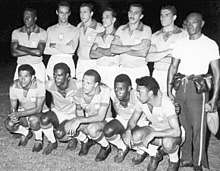
For the 1958 World Cup, Brazil were drawn in a group with England, the USSR and Austria. They beat Austria 3–0 in their first match, then drew 0–0 with England. Before the match, coach Vicente Feola made three substitutions that were crucial for Brazil to defeat the Soviets: Zito, Garrincha and Pelé. From the kick-off, they kept up the pressure relentlessly, and after three minutes, which were later described as "the greatest three minutes in the history of football",[40] Vavá gave Brazil the lead. They won the match by 2–0. Pelé scored the only goal of their quarter-final match against Wales, and they beat France 5–2 in the semi-final. Brazil then beat Sweden 5–2 in the final, winning their first World Cup and becoming the first nation to win a World Cup title outside of its own continent. Pelé described it tearfully as a nation coming of age.[41]
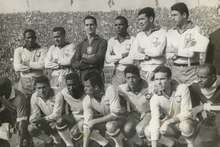
In the 1962 World Cup, Brazil earned its second title with Garrincha as the star player, a mantle and responsibility laid upon him after the regular talisman, Pelé, was injured during the second group match against Czechoslovakia and unable to play for the rest of the tournament.[42][43]
In the 1966 World Cup, Brazil had their worst performance in a World Cup. The 1966 tournament was remembered for its excessively physical play, and Pelé was one of the players most affected. Against Portugal, several violent tackles by the Portuguese defenders caused Pelé to leave the match and the tournament. Brazil lost this match and was eliminated in the first round of the World Cup for the first time since 1934. They have not failed to reach the knockout stages of the competition since. Brazil became the second nation to be eliminated in the first round while holding the World Cup crown following Italy in 1950. After the 2002, 2010, 2014 and 2018 World Cups, France, Italy, Spain and Germany were also added to this list. As for now, Brazil remains the only non-UEFA team to be eliminated from the group stage after winning previous World Cup edition.[44] After the tournament, Pelé declared that he did not wish to play in the World Cup again. Nonetheless, he returned in 1970.[45]
Brazil won its third World Cup in Mexico in 1970. It fielded what has since then often been considered the best World Cup football squad ever,[14][15][16][19] led by Pelé in his last World Cup finals, captain Carlos Alberto Torres, Jairzinho, Tostão, Gérson and Rivelino. Even though Garrincha had retired, this team was still a force to be reckoned with. They won all six of their games—against Czechoslovakia, England and Romania during group play, and against Peru, Uruguay and Italy in the knockout rounds. Jairzinho was the second top scorer with seven goals; Pelé finished with four goals. Brazil lifted the Jules Rimet trophy for the third time (the first nation to do so), which meant that they were allowed to keep it. A replacement was then commissioned, though it would be 24 years before Brazil won it again.[46]
The dry spell (1974–1990)
After the international retirement of Pelé and other stars from the 1970 squad, Brazil was not able to overcome the Netherlands at the 1974 World Cup in West Germany, and finished in fourth place after losing the third place game to Poland.[47]
In the second group stage of the 1978 World Cup, Brazil competed with tournament hosts Argentina for top spot and a place in the finals. In their last group match, Brazil defeated Poland 3–1 to go to the top of the group with a goal difference of +5. Argentina had had a goal difference of +2, but in its last group match, it defeated Peru 6–0, and thus qualified for the final in a match accused of ultimately-unproven match fixing. The Brazilian team qualified for the third place, and were the only team to remain unbeaten in the tournament.
At the 1982 World Cup, held in Spain, Brazil were the tournament favorites, and easily moved through the early part of the draw, but a 3–2 defeat in Barcelona to Italy, in a classic World Cup match, eliminated them from the tournament in the match that they refer to as "Sarriá's Disaster", referencing the stadium's name. The 1982 team, with a midfield of Sócrates, Zico, Falcão and Éder, is remembered as perhaps the greatest team never to win a World Cup.[20]
Several players, including Sócrates and Zico, from 1982 returned to play at the 1986 World Cup in Mexico. Brazil, still a very good team and more disciplined defensively than four years earlier, met the Michel Platini-led France in the quarter-finals in a classic of Total Football. The game played to a 1–1 draw in regulation time, and after a goalless extra time, it all came down to a penalty shoot-out, where Brazil was defeated 4–3. After 40 years, Brazil was victorious in the 1989 Copa América, this being their fourth victory in four tournaments hosted in Brazil. This achievement ended a 19-year streak without official titles for the Brazilians. The last one had been in the 1970 World Cup.
At the 1990 World Cup in Italy, Brazil was coached by Sebastião Lazaroni, that had been the coach in the 1989 Copa América. With a defensive scheme, whose main symbol was midfielder Dunga, forward Careca and three centre-backs, the team lacked creativity but made it to the second round. Brazil was eliminated by Diego Maradona-led Argentina in the round of 16 in Turin, losing to their South American archrivals 1–0.[48]
Return to winning ways (1994–2002)
Brazil went 24 years without winning a World Cup or even participating in a final. Their struggles ended at the 1994 tournament in the United States, where a solid side headed by Romário and Bebeto in attack, captain Dunga in midfield, goalkeeper Cláudio Taffarel and defender Jorginho, won the World Cup for a then-record fourth time. Highlights of their campaign included a 1–0 victory over the United States in the round of 16 at Stanford University, a 3–2 win over the Netherlands in the quarter-finals in Dallas, and a 1–0 victory over Sweden in the semi-finals at Pasadena's Rose Bowl. This set up Brazil–Italy in the final in Pasadena. A game played in searing heat which ended as a goalless draw, with Italy's defence led by Franco Baresi keeping out Romário, penalty kicks loomed, and Brazil became champions with Roberto Baggio missing Italy's last penalty.[49] Despite the triumph, the 1994 World Cup winning team is not held in the same high esteem in Brazil as their other World Cup winning teams. FourFourTwo magazine labelled the 1994 team “unloved” in Brazil due to their pragmatic, defensive style over the more typical Brazilian style of attacking flair.[46]
Entering the 1998 World Cup as defending champions, Brazil finished runner-up. Having topped their group and won the next two rounds, Brazil beat the Netherlands on penalties in the semi-final following a 1–1 draw. Player of the tournament Ronaldo scored four goals and made three assists en route to the final. The build up to the final itself was overshadowed by the world's best player Ronaldo suffering a convulsive fit only hours before kick off.[50] The starting line up without Ronaldo was released to a shocked world media, but after pleading that he felt fine and requested to play, Ronaldo was reinstated by the coach, before giving a below par performance as France, led by Zidane won 3–0.[51]
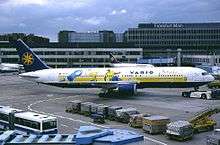
Fuelled by the "Three R's" (Ronaldo, Rivaldo and Ronaldinho), Brazil won its fifth championship at the 2002 World Cup, held in South Korea and Japan. Brazil beat all three opponents in group play in South Korea and topped the group. In Brazil's opening game against Turkey, in Ulsan, Rivaldo fell to the ground clutching his face after Turkey's Hakan Ünsal had kicked the ball at his legs. Rivaldo escaped suspension but was fined £5,180 for play-acting, and became the first player ever to be punished in FIFA's crackdown on diving. In their knockout round matches in Japan, Brazil defeated Belgium 2–0 in Kobe in the round of 16. Brazil defeated England 2–1 in the quarter-finals in Shizuoka, with the winning goal coming from an unexpected free-kick by Ronaldinho from 40 yards out.[52] The semi-final was against Turkey in Saitama; Brazil won 1–0. The final was between Germany and Brazil in Yokohama, where Ronaldo scored two goals in Brazil's 2–0 triumph.[53] Ronaldo also won the Golden Shoe as the tournament's leading scorer with 8 goals.[54] Brazil's success saw them receive the Laureus World Sports Award for Team of the Year.[55]
World Cup drought (2002–present)
Brazil won the 2004 Copa América, their third win in four competitions since 1997.[56] Brazil also won the 2005 FIFA Confederations Cup for the second time.[57] Manager Carlos Alberto Parreira built his side through a 4–2–2–2 formation. Nicknamed the "Magic quartet", the attack was built around four players: Ronaldo, Adriano, Kaká and Ronaldinho.[58]
In the 2006 World Cup, Brazil won its first two games against Croatia (1–0) and Australia (2–0). In the final group game against Japan, Brazil won 4–1. Ronaldo scored twice and equalled the record for the most goals scored across all World Cups. In the round of 16, Brazil beat Ghana 3–0. Ronaldo's goal was his 15th in World Cup history, breaking the record. Brazil, however, was eliminated in the quarter-finals against France, losing 1–0 to a Thierry Henry goal.[58]
Dunga was hired as Brazil's new team manager in 2006.[59] Brazil then won the 2007 Copa América, where forward Robinho was awarded the Golden Boot and named the tournament's best player. Two years later, Brazil won the 2009 FIFA Confederations Cup, defeating the U.S. 3–2 in the final, to seal their third Confederations Cup title.[60] Kaká was named as the player of the tournament while striker Luís Fabiano won the top goalscorer award.[61]
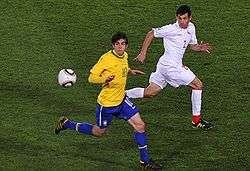
At the 2010 World Cup in South Africa, Brazil won their first two matches against North Korea (2–1) and the Ivory Coast (3–1), respectively. Their last match, against Portugal, ended in a 0–0 draw. They faced Chile in the round of 16, winning 3–0, although in the quarter-final they fell to the Netherlands 2–1.[62]
In July 2010, Mano Menezes was named as Brazil's new coach.[63] At the 2011 Copa América, Brazil lost against Paraguay and was eliminated in the quarter-finals. On 4 July 2012, due to a lack of competitive matches because the team had automatically qualified for the 2014 World Cup as tournament hosts, Brazil was ranked 11th in the FIFA ranking.
Return of Luiz Felipe Scolari (2013–14)
In November 2012, coach Mano Menezes was sacked and replaced by Luiz Felipe Scolari.[64][65]
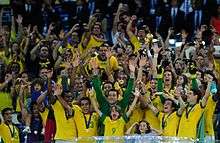
On 6 June 2013, Brazil was ranked 22nd in the FIFA ranking, their lowest-ever rank.[66] Brazil entered the 2013 Confederations Cup with the objective of defending their title. In the final, Brazil faced Spain,[67] winning 3–0 and sealing their fourth Confederations Cup title.[68][69] Neymar was named player of the tournament and received the Golden Ball Award and the Adidas Bronze Shoe, and Júlio César won the Golden Glove Award for the best goalkeeper of the tournament.[70]
2014 World Cup
In the opening match of the 2014 World Cup against Croatia, two goals from Neymar and one from Oscar saw the Seleção off to a winning start in their first World Cup on home soil in 64 years.[71] The team then drew with Mexico, before confirming qualification to the knockout stage by defeating Cameroon 4–1 with Neymar again scoring twice, and Fred and Fernandinho providing further goals.[72][73] Brazil faced Chile in the round of 16, taking an 18th-minute lead through David Luiz's first goal for the Seleção in a 1–1 draw. Brazil prevailed 3–2 on penalties, with Neymar, David Luiz and Marcelo converting their kicks, and goalkeeper Júlio César saving three times.[74]
.jpg)
The team again faced South American opposition in the quarter-final, defeating Colombia 2–1 with goals from central defenders David Luiz and the team captain Thiago Silva. Late in the match, Neymar was stretchered off after Juan Camilo Zúñiga's knee had made contact with the forward's back. Neymar was taken to hospital and was diagnosed with a fractured vertebra, ruling him out for the remainder of the tournament.[75] Prior to this, Neymar had scored four goals, provided one assist, and been named man of the match twice. Brazil faced further problems ahead of their semi-final against Germany, as Thiago Silva was to serve a one-match suspension for receiving his second yellow card of the tournament in the quarter-final.[76]
The Seleção went on to lose 1–7 to the Germans – their biggest ever defeat at the World Cup and first home loss in a competitive match since 1975.[77] Towards the end of the match, the home crowd began to "olé" each pass from the German team, and booed their own players off the pitch after the final whistle.[78] The match has been nicknamed the Mineirazo, making reference to the nation's previous World Cup defeat on home soil, the Maracanazo against Uruguay in 1950, and the Estádio do Mineirão where the match took place.[79] Brazil finished the World Cup in fourth place, having failed to avenge their semi-final defeat to Germany by losing to the Netherlands 0–3 in the third-place match.[80][81] The team ended the tournament with the worst defensive record of the 32 competing nations, having conceded 14 goals.[82] The only other countries to concede 12 or more goals in the current World Cup format are North Korea and Saudi Arabia.[83] Following these results, Scolari announced his resignation.[84]
Return of Dunga (2014–2016)
_(cropped).jpg)
On 22 July 2014, Dunga was announced as the new manager of Brazil, returning to the position for the first time since the team's exit at the 2010 World Cup.[85]
Dunga's first match in his second reign as Brazil's manager was a friendly match against 2014 World Cup quarter-finalists Colombia at Sun Life Stadium in Miami on 5 September 2014, with Brazil winning the match 1–0 through an 83rd-minute Neymar free-kick goal.[86] Dunga followed this up with wins against Ecuador (1–0),[87] in the 2014 Superclásico de las Américas against Argentina (2–0),[88] against Japan (4–0),[89] against Turkey (0–4),[90] and against Austria (1–2).[91] Dunga continued Brazil's winning streak in 2015 by defeating France 3–1 in another friendly. They followed this with wins against Chile (1–0), Mexico (2–0) and Honduras (1–0).
2015 Copa América
Brazil started the tournament with a victory against Peru after coming from behind by 2–1 (with Douglas Costa scoring in the dying moments),[92] followed by a 1–0 defeat against Colombia[93] and a 2–1 victory against Venezuela.[94] In the knockout stage, Brazil faced Paraguay and was eliminated after drawing 1–1 in normal time and losing 4–3 in the penalty shootout.[95] As such, Brazil was unable to qualify for a FIFA Confederations Cup (in this case, the 2017 edition) for the first time in almost 20 years.[96]
Copa América Centenario
Brazil began the 2016 Copa América Centenario with a scoreless draw against Ecuador, with the Ecuadorians having a goal wrongly disallowed in the second half.[97] This was followed by an emphatic 7–1 victory over Haiti, with Philippe Coutinho scoring a hat-trick.[98] Needing only a draw to progress to the knockout stage of the tournament, Brazil suffered a controversial 1–0 loss to Peru, with Raúl Ruidíaz scoring in the 75th minute by guiding the ball into the net with his arm.[99] This loss, Brazil's first loss to Peru since 1985,[100] saw Brazil eliminated from the tournament in the group stage for the first time since 1987.[101][102][103]
Tite era (2016–)
.jpg)
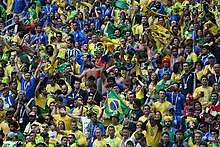
On 14 June 2016, Dunga was sacked as manager of Brazil.[104] Tite, who had managed Corinthians, the 2015 Brazilian champions and 2012 Club World Cup champions, was confirmed as his replacement six days later.[105] Tite's debut was marked with a 3–0 away victory against Ecuador on 2 September,[106] followed by a 2–1 win over Colombia, a 5–0 win against Bolivia and a 0–2 victory away against Venezuela, bringing Brazil to the top of the World Cup Qualifiers leaderboard for the first time since 2011.[107] Brazil then defeated Paraguay 3–0 to become the first team, other than the hosts Russia, to qualify for the 2018 World Cup.[108]
Brazil started their 2018 World Cup campaign with a draw against Switzerland – Brazil's goal coming from a 25-yard bending strike from Philippe Coutinho – their first non-win in an opener since 1978.[109] In the following match against Costa Rica on 22 June, goals from Coutinho and Neymar in stoppage time saw Brazil win 2–0.[110] They won their final group game 2–0 over Serbia with goals from Paulinho and Thiago Silva, meaning qualification for the last 16 as group winners.[111] On 2 July, goals from Neymar and Roberto Firmino saw Brazil 2–0 win over Mexico to advance to the quarter-finals.[112] On 6 July, Brazil were eliminated from the 2018 World Cup by Belgium in the quarter-finals, losing 2–1, with Fernandinho scoring an own goal for Belgium while Renato Augusto scored the only goal for Brazil.[113][114][115]
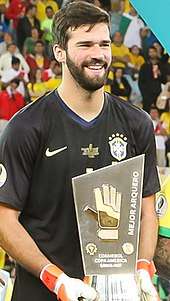
In spite of World Cup failure, the CBF continued to trust Tite and allowed him to continue his job as coach of Brazil for the 2019 Copa América held at home. However, Brazilian perpetration for the tournament at home was hampered by the injury of Neymar in the friendly match where Brazil thrashed 2019 AFC Asian Cup champions Qatar 2–0.[116] Despite this loss, Tite managed Brazil to the first ever international conquest and Brazil's first ever great international honor since 2007. The Brazilians overcame Bolivia despite of negative reaction from home fans after a goalless first half[117] and Peru in a celebrating 5–0 demolition.[118] Between these matches, Brazil drew Venezuela in a disappointing 0–0 draw with three goals ruled out by VAR.[119] Brazil met Paraguay in the quarter-finals and overcame Paraguay 4–3 in penalty shootout after another disappointing goalless draw.[120] In the famed semi-finals clash against neighboring rival and fellow powerhouse Argentina of Lionel Messi, Brazil put up its best performance to date, beating the Argentines 2–0 to march to the final facing the Peruvians for the second times.[121] In the final, Brazil managed to beat the Peruvians once again 3–1 to conquer the ninth Copa América title.[122] The win of Brazil, however, was criticized by Argentina coach Lionel Scaloni, who accused CONMEBOL for VAR match-fixing and that Brazil was "designed" to win the tournament,[123] an accusation Tite rejected.
Nicknames
The Brazil national team is known by different names in various parts of the world. Nicknames for the squad in Brazil include: Canarinha, meaning 'Little Canary', a reference to a species of bird commonly found in Brazil that has a vivid yellow color; this phrase was popularized by the late cartoonist Fernando "Mangabeira" Pieruccetti during the 1950 World Cup.[124] Amarelinha (Little Yellow One), Seleção (The National Squad), Verde-amarelo (Green and Yellow), Pentacampeão (Five-time Champions),[125] and Esquadrão de Ouro (The Golden Squad). Some Latin American commentators often refer to the Brazil team as El Scratch (The Scratch), among others.[126]
Team image
| Wikimedia Commons has media related to Brazil national football team kits. |
Brazil's first team colors were white with blue collars, but following the defeat at Maracanã in the 1950 World Cup, the colors were criticised for lacking patriotism. With permission from the Brazilian Sports Confederation, the newspaper Correio da Manhã held a competition to design a new kit incorporating the four colors of the Brazilian flag.[127] The winning design was a yellow jersey with green trim and blue shorts with the white trim drawn by Aldyr Garcia Schlee, a nineteen-year-old from Pelotas.[128] The new colors were first used in March 1954 in a match against Chile, and have been used ever since. Topper were the manufacturers of Brazil's kit up to and including the match against Wales on 11 September 1991; Umbro took over before the next match, versus Yugoslavia in October 1991.[129] Nike began making Brazil kits in time for the 1998 World Cup.[130]
The use of blue as the second kit color dates from the 1930s, but it became the permanent second choice accidentally in the 1958 World Cup Final. Brazil's opponents were Sweden, who also wear yellow, and a draw gave the home team, Sweden, the right to play in yellow. Brazil, who travelled with no second kit, hurriedly purchased a set of blue shirts and sewed on them the badges taken from their yellow shirts.[131]
Venues
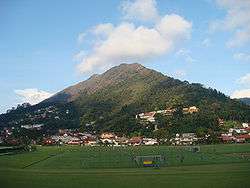
Brazil does not have a home national stadium like many other national teams, and rotates their home World Cup qualifying matches in various venues throughout the country, such as the Maracanã Stadium in Rio de Janeiro. Since September 2006, Brazil has played many international friendlies at Arsenal's Emirates Stadium in London, England. Brazil also plays a number of international friendlies in the United States and other parts of the world as part of the Brasil Global Tour.
Brazil's training camp is the Granja Comary in Teresópolis, located 90 km (56 mi) from Rio de Janeiro.[134] Granja Comary was opened in 1987,[135] and underwent significant renovations in 2013 and 2014.
Competitive record
FIFA World Cup
Brazil has qualified for every FIFA World Cup they entered, never requiring a qualifying play-off. With five titles, they have won the tournament on more occasions than any other national team.
| FIFA World Cup record | FIFA World Cup qualification record | ||||||||||||||
|---|---|---|---|---|---|---|---|---|---|---|---|---|---|---|---|
| Year | Round | Position | Pld | W | D | L | GF | GA | Pld | W | D | L | GF | GA | |
| Group stage | 6th | 2 | 1 | 0 | 1 | 5 | 2 | Qualified as invitees | |||||||
| Round of 16 | 14th | 1 | 0 | 0 | 1 | 1 | 3 | Qualified automatically | |||||||
| Third place | 3rd | 5 | 3 | 1 | 1 | 14 | 11 | Qualified automatically | |||||||
| Runners-up | 2nd | 6 | 4 | 1 | 1 | 22 | 6 | Qualified as hosts | |||||||
| Quarter-finals | 5th | 3 | 1 | 1 | 1 | 8 | 5 | 4 | 4 | 0 | 0 | 8 | 1 | ||
| Champions | 1st | 6 | 5 | 1 | 0 | 16 | 4 | 2 | 1 | 1 | 0 | 2 | 1 | ||
| Champions | 1st | 6 | 5 | 1 | 0 | 14 | 5 | Qualified as defending champions | |||||||
| Group stage | 11th | 3 | 1 | 0 | 2 | 4 | 6 | Qualified as defending champions | |||||||
| Champions | 1st | 6 | 6 | 0 | 0 | 19 | 7 | 6 | 6 | 0 | 0 | 23 | 2 | ||
| Fourth place | 4th | 7 | 3 | 2 | 2 | 6 | 4 | Qualified as defending champions | |||||||
| Third place | 3rd | 7 | 4 | 3 | 0 | 10 | 3 | 6 | 4 | 2 | 0 | 17 | 1 | ||
| Second round | 5th | 5 | 4 | 0 | 1 | 15 | 6 | 4 | 4 | 0 | 0 | 11 | 2 | ||
| Quarter-finals | 5th | 5 | 4 | 1 | 0 | 10 | 1 | 4 | 2 | 2 | 0 | 6 | 2 | ||
| Round of 16 | 9th | 4 | 3 | 0 | 1 | 4 | 2 | 4 | 3 | 1 | 0 | 13 | 1 | ||
| Champions | 1st | 7 | 5 | 2 | 0 | 11 | 3 | 8 | 5 | 2 | 1 | 20 | 4 | ||
| Runners-up | 2nd | 7 | 4 | 1 | 2 | 14 | 10 | Qualified as defending champions | |||||||
| Champions | 1st | 7 | 7 | 0 | 0 | 18 | 4 | 18 | 9 | 3 | 6 | 31 | 17 | ||
| Quarter-finals | 5th | 5 | 4 | 0 | 1 | 10 | 2 | 18 | 9 | 7 | 2 | 35 | 17 | ||
| Quarter-finals | 6th | 5 | 3 | 1 | 1 | 9 | 4 | 18 | 9 | 7 | 2 | 33 | 11 | ||
| Fourth place | 4th | 7 | 3 | 2 | 2 | 11 | 14 | Qualified as hosts | |||||||
| Quarter-finals | 6th | 5 | 3 | 1 | 1 | 8 | 3 | 18 | 12 | 5 | 1 | 41 | 11 | ||
| To be determined | To be determined | ||||||||||||||
| Total | 5 Titles | 21/21 | 109 | 73 | 18 | 18 | 229 | 105 | 110 | 68 | 30 | 12 | 240 | 70 | |
Copa América
| South American Championship / Copa América record | ||||||||
|---|---|---|---|---|---|---|---|---|
| Year | Round | Position | Pld | W | D | L | GF | GA |
| Third place | 3rd | 3 | 0 | 2 | 1 | 3 | 4 | |
| Third place | 3rd | 3 | 1 | 0 | 2 | 7 | 8 | |
| Champions | 1st | 4 | 3 | 1 | 0 | 12 | 3 | |
| Third place | 3rd | 3 | 1 | 0 | 2 | 1 | 8 | |
| Runners-up | 2nd | 3 | 1 | 0 | 2 | 4 | 3 | |
| Champions | 1st | 5 | 2 | 3 | 0 | 7 | 2 | |
| Fourth place | 4th | 3 | 0 | 0 | 3 | 2 | 5 | |
| Withdrew | ||||||||
| Runners-up | 2nd | 4 | 2 | 1 | 1 | 11 | 9 | |
| Withdrew | ||||||||
| Runners-up | 2nd | 6 | 4 | 0 | 2 | 17 | 11 | |
| Withdrew | ||||||||
| Third place | 3rd | 6 | 3 | 1 | 2 | 15 | 7 | |
| Runners-up | 2nd | 6 | 5 | 0 | 1 | 19 | 5 | |
| Runners-up | 2nd | 5 | 3 | 1 | 1 | 13 | 7 | |
| Withdrew | ||||||||
| Champions | 1st | 8 | 7 | 0 | 1 | 46 | 7 | |
| Runners-up | 2nd | 7 | 4 | 0 | 3 | 17 | 9 | |
| Withdrew | ||||||||
| Fourth place | 4th | 5 | 2 | 2 | 1 | 4 | 5 | |
| Runners-up | 2nd | 6 | 4 | 0 | 2 | 23 | 9 | |
| Runners-up | 2nd | 6 | 4 | 2 | 0 | 17 | 7 | |
| Third place | 3rd | 4 | 2 | 0 | 2 | 7 | 10 | |
| Fourth place | 4th | 6 | 2 | 1 | 3 | 12 | 13 | |
| Withdrew | ||||||||
| Third place | 3rd | 6 | 5 | 0 | 1 | 16 | 4 | |
| Third place | 3rd | 6 | 2 | 2 | 2 | 10 | 9 | |
| Runners-up | 2nd | 8 | 2 | 4 | 2 | 8 | 5 | |
| Group stage | 5th | 2 | 1 | 0 | 1 | 5 | 4 | |
| Champions | 1st | 7 | 5 | 2 | 0 | 11 | 1 | |
| Runners-up | 2nd | 7 | 4 | 1 | 2 | 12 | 8 | |
| Quarter-finals | 5th | 4 | 1 | 2 | 1 | 6 | 4 | |
| Runners-up | 2nd | 6 | 4 | 2 | 0 | 10 | 3 | |
| Champions | 1st | 6 | 6 | 0 | 0 | 22 | 3 | |
| Champions | 1st | 6 | 6 | 0 | 0 | 17 | 2 | |
| Quarter-finals | 6th | 4 | 2 | 0 | 2 | 5 | 4 | |
| Champions | 1st | 6 | 3 | 2 | 1 | 13 | 6 | |
| Champions | 1st | 6 | 4 | 1 | 1 | 15 | 5 | |
| Quarter-finals | 8th | 4 | 1 | 3 | 0 | 6 | 4 | |
| Quarter-finals | 5th | 4 | 2 | 1 | 1 | 5 | 4 | |
| Group stage | 9th | 3 | 1 | 1 | 1 | 7 | 2 | |
| Champions | 1st | 6 | 4 | 2 | 0 | 13 | 1 | |
| Qualified | ||||||||
| Qualified | ||||||||
| Total | 9 Titles | 36/46 | 184 | 103 | 37 | 44 | 418 | 201 |
FIFA Confederations Cup
| FIFA Confederations Cup record | |||||||||
|---|---|---|---|---|---|---|---|---|---|
| Year | Round | Position | Pld | W | D | L | GF | GA | Squad |
| Did not qualify | |||||||||
| Champions | 1st | 5 | 4 | 1 | 0 | 14 | 2 | Squad | |
| Runners-up | 2nd | 5 | 4 | 0 | 1 | 18 | 6 | Squad | |
| Fourth place | 4th | 5 | 1 | 2 | 2 | 3 | 3 | Squad | |
| Group stage | 5th | 3 | 1 | 1 | 1 | 3 | 3 | Squad | |
| Champions | 1st | 5 | 3 | 1 | 1 | 12 | 6 | Squad | |
| Champions | 1st | 5 | 5 | 0 | 0 | 14 | 5 | Squad | |
| Champions | 1st | 5 | 5 | 0 | 0 | 14 | 3 | Squad | |
| Did not qualify | |||||||||
| Total | 4 titles | 7/10 | 33 | 23 | 5 | 5 | 78 | 28 | – |
Olympic Games
| Olympic Games record | ||||||||
|---|---|---|---|---|---|---|---|---|
| Year | Round | Position | GP | W | D | L | GF | GA |
| Did not participate | ||||||||
| Did not qualify | ||||||||
| Did not participate | ||||||||
| Quarter-finals | 6th | 3 | 2 | 0 | 1 | 9 | 6 | |
| Did not qualify | ||||||||
| Round 1 | 6th | 3 | 2 | 0 | 1 | 10 | 6 | |
| Round 1 | 9th | 3 | 1 | 1 | 1 | 5 | 2 | |
| Round 1 | 11th | 3 | 0 | 2 | 1 | 4 | 5 | |
| Round 1 | 12th | 3 | 0 | 1 | 2 | 4 | 6 | |
| Fourth place | 4th | 5 | 2 | 1 | 2 | 6 | 6 | |
| Did not qualify | ||||||||
| Silver medal | 2nd | 6 | 4 | 1 | 1 | 9 | 5 | |
| Silver medal | 2nd | 6 | 4 | 1 | 1 | 12 | 4 | |
| Since 1992 | See Brazil national under-23 football team | |||||||
| Total | 2 Silver medals | 8/19 | 32 | 15 | 7 | 10 | 59 | 40 |
Pan American Games
| Pan American Games record | ||||||||
|---|---|---|---|---|---|---|---|---|
| Year | Round | Position | GP | W | D | L | GF | GA |
| Did not participate | ||||||||
| Silver medal | 2nd | 6 | 4 | 1 | 1 | 27 | 11 | |
| Gold medal | 1st | 4 | 3 | 1 | 0 | 18 | 3 | |
| Did not participate | ||||||||
| Gold medal | 1st | 6 | 5 | 1 | 0 | 33 | 2 | |
| Gold medal | 1st | 5 | 5 | 0 | 0 | 14 | 1 | |
| Silver medal | 2nd | 3 | 2 | 0 | 1 | 3 | 1 | |
| Gold medal | 1st | 5 | 4 | 1 | 0 | 10 | 2 | |
| Did not participate | ||||||||
| Quarter-finals | 5th | 4 | 2 | 2 | 0 | 5 | 2 | |
| Since 1999 | See Brazil national under-23 football team | |||||||
| Total | 4 Gold medals | 7/18 | 33 | 25 | 6 | 2 | 110 | 22 |
All-time head-to-head record
Below is a result summary of all matches Brazil have played against FIFA recognized teams.[136] Updated on 19 November 2019.
Positive Record Neutral Record Negative Record
| Opponents | Pld | W | D | L | GF | GA | GD | Win % |
|---|---|---|---|---|---|---|---|---|
| 107 | 42 | 27 | 39 | 165 | 161 | +4 | 39.25% | |
| 80 | 47 | 22 | 11 | 173 | 67 | +106 | 58.75% | |
| 76 | 36 | 20 | 20 | 136 | 97 | +39 | 47.36% | |
| 72 | 51 | 13 | 8 | 167 | 61 | +106 | 70.08% | |
| 46 | 32 | 9 | 5 | 98 | 31 | +67 | 69.56% | |
| 41 | 24 | 7 | 10 | 75 | 36 | +41 | 58.53% | |
| 32 | 19 | 10 | 3 | 64 | 17 | +47 | 59.37% | |
| 32 | 26 | 4 | 2 | 94 | 22 | +72 | 82.75% | |
| 31 | 21 | 5 | 5 | 99 | 25 | +74 | 67.74% | |
| 26 | 11 | 11 | 4 | 34 | 23 | +11 | 44.00% | |
| 25 | 21 | 3 | 1 | 89 | 8 | +81 | 86.95% | |
| 23 | 13 | 5 | 5 | 41 | 31 | +10 | 56.52% | |
| 20 | 13 | 3 | 4 | 39 | 16 | +23 | 65.00% | |
| 20 | 19 | 0 | 1 | 43 | 12 | +31 | 95.00% | |
| 20 | 11 | 7 | 2 | 39 | 23 | +16 | 55.00% | |
| 19 | 11 | 6 | 2 | 32 | 15 | +17 | 57.89% | |
| 16 | 8 | 3 | 5 | 30 | 23 | +7 | 50.00% | |
| 16 | 7 | 4 | 5 | 27 | 20 | +7 | 43.75% | |
| 15 | 10 | 3 | 2 | 35 | 17 | +18 | 66.66% | |
| 13 | 9 | 4 | 0 | 26 | 7 | +19 | 69.23% | |
| 12 | 9 | 2 | 1 | 37 | 19 | +18 | 75.00% | |
| 12 | 3 | 5 | 4 | 15 | 18 | −3 | 25.00% | |
| 12 | 10 | 2 | 0 | 34 | 5 | +29 | 81.81% | |
| 11 | 10 | 0 | 1 | 34 | 9 | +25 | 90.00% | |
| 10 | 8 | 2 | 0 | 16 | 3 | +13 | 80.00% | |
| 10 | 8 | 1 | 1 | 20 | 5 | +15 | 80.00% | |
| 10 | 7 | 3 | 0 | 17 | 5 | +12 | 70.00% | |
| 9 | 5 | 2 | 2 | 14 | 8 | +6 | 55.55% | |
| 9 | 3 | 4 | 2 | 11 | 9 | +2 | 33.30% | |
| 8 | 8 | 0 | 0 | 19 | 2 | +17 | 100.00% | |
| 8 | 6 | 1 | 1 | 29 | 6 | +23 | 75.00% | |
| 8 | 6 | 1 | 1 | 21 | 1 | +20 | 75.00% | |
| 6 | 6 | 0 | 0 | 18 | 4 | +14 | 100.00% | |
| 6 | 5 | 0 | 1 | 12 | 2 | +10 | 83.33% | |
| 6 | 5 | 0 | 1 | 11 | 4 | +7 | 83.33% | |
| 6 | 4 | 2 | 0 | 10 | 3 | +7 | 66.66% | |
| 6 | 4 | 1 | 1 | 12 | 2 | +10 | 66.66% | |
| 5 | 5 | 0 | 0 | 12 | 3 | +9 | 100.00% | |
| 5 | 5 | 0 | 0 | 18 | 3 | +15 | 100.00% | |
| 5 | 4 | 1 | 0 | 17 | 1 | +16 | 80.00% | |
| 5 | 3 | 0 | 2 | 11 | 8 | +3 | 60.00% | |
| 5 | 1 | 1 | 3 | 7 | 11 | −4 | 20.00% | |
| 4 | 4 | 0 | 0 | 13 | 2 | +11 | 100.00% | |
| 4 | 4 | 0 | 0 | 8 | 0 | +8 | 100.00% | |
| 4 | 3 | 1 | 0 | 10 | 4 | +6 | 75.00% | |
| 4 | 3 | 1 | 0 | 7 | 2 | +5 | 75.00% | |
| 4 | 2 | 2 | 0 | 8 | 4 | +4 | 50.00% | |
| 4 | 0 | 2 | 2 | 5 | 8 | −3 | 0.00% | |
| 3 | 3 | 0 | 0 | 17 | 1 | +16 | 100.00% | |
| 3 | 3 | 0 | 0 | 13 | 0 | +13 | 100.00% | |
| 3 | 3 | 0 | 0 | 11 | 1 | +10 | 100.00% | |
| 3 | 3 | 0 | 0 | 10 | 0 | +10 | 100.00% | |
| 3 | 3 | 0 | 0 | 9 | 3 | +6 | 100.00% | |
| 3 | 3 | 0 | 0 | 6 | 2 | +4 | 100.00% | |
| 3 | 2 | 1 | 0 | 12 | 0 | +12 | 66.66% | |
| 3 | 2 | 1 | 0 | 2 | 0 | +2 | 66.66% | |
| 3 | 2 | 0 | 1 | 6 | 7 | −1 | 66.66% | |
| 2 | 2 | 0 | 0 | 9 | 1 | +8 | 100.00% | |
| 2 | 2 | 0 | 0 | 5 | 0 | +5 | 100.00% | |
| 2 | 2 | 0 | 0 | 3 | 1 | +2 | 100.00% | |
| 2 | 1 | 1 | 0 | 4 | 1 | +3 | 50.00% | |
| 2 | 1 | 1 | 0 | 4 | 1 | +3 | 50.00% | |
| 2 | 1 | 1 | 0 | 3 | 0 | +3 | 50.00% | |
| 1 | 1 | 0 | 0 | 14 | 0 | +14 | 100.00% | |
| 1 | 1 | 0 | 0 | 8 | 0 | +8 | 100.00% | |
| 1 | 1 | 0 | 0 | 7 | 0 | +7 | 100.00% | |
| 1 | 1 | 0 | 0 | 7 | 1 | +6 | 100.00% | |
| 1 | 1 | 0 | 0 | 6 | 0 | +6 | 100.00% | |
| 1 | 1 | 0 | 0 | 5 | 0 | +5 | 100.00% | |
| 1 | 1 | 0 | 0 | 5 | 1 | +4 | 100.00% | |
| 1 | 1 | 0 | 0 | 4 | 0 | +4 | 100.00% | |
| 1 | 1 | 0 | 0 | 4 | 1 | +3 | 100.00% | |
| 1 | 1 | 0 | 0 | 3 | 0 | +3 | 100.00% | |
| 1 | 1 | 0 | 0 | 3 | 0 | +3 | 100.00% | |
| 1 | 1 | 0 | 0 | 3 | 0 | +3 | 100.00% | |
| 1 | 1 | 0 | 0 | 3 | 0 | +3 | 100.00% | |
| 1 | 1 | 0 | 0 | 3 | 0 | +3 | 100.00% | |
| 1 | 1 | 0 | 0 | 3 | 0 | +3 | 100.00% | |
| 1 | 1 | 0 | 0 | 3 | 1 | +2 | 100.00% | |
| 1 | 1 | 0 | 0 | 3 | 1 | +2 | 100.00% | |
| 1 | 1 | 0 | 0 | 2 | 0 | +2 | 100.00% | |
| 1 | 1 | 0 | 0 | 2 | 0 | +2 | 100.00% | |
| 1 | 1 | 0 | 0 | 2 | 0 | +2 | 100.00% | |
| 1 | 1 | 0 | 0 | 2 | 0 | +2 | 100.00% | |
| 1 | 1 | 0 | 0 | 2 | 0 | +2 | 100.00% | |
| 1 | 1 | 0 | 0 | 2 | 1 | +1 | 100.00% | |
| 1 | 1 | 0 | 0 | 1 | 0 | +1 | 100.00% | |
| 1 | 0 | 1 | 0 | 1 | 1 | 0 | 0.00% | |
| Total (89) | 973 | 614 | 201 | 158 | 2125 | 884 | +1241 | 63.06% |
- East Germany won the Olympics in 1976, but the current Germany national team hasn't inherited their Olympic record.
- Includes matches against

- Includes matches against
.svg.png)
- Includes matches against

- Includes matches against

- Includes matches against
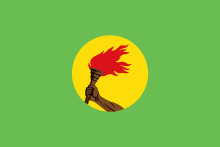
Results and fixtures
Win Draw Loss
2019
| 6 September Brasil Global Tour | Brazil | 2–2 | Miami Gardens, United States | |
| 21:30 EDT (UTC–4) | Casemiro Neymar |
Report | Muriel |
Stadium: Hard Rock Stadium Attendance: 65,232 Referee: Ismail Elfath (United States) |
| 10 September Brasil Global Tour | Brazil | 0–1 | Los Angeles, United States | |
| 20:00 PST (UTC−8) | Report | Abram |
Stadium: Los Angeles Memorial Coliseum Attendance: 32,287 Referee: Jair Marrufo (United States) |
| 10 October Brasil Global Tour | Brazil | 1–1 | Kallang, Singapore | |
| 20:00 SST (UTC+8) | Firmino |
Report | Diédhiou |
Stadium: Singapore National Stadium Attendance: 20,621 Referee: Muhammad Taqi (Singapore) |
| 13 October Brasil Global Tour | Brazil | 1–1 | Kallang, Singapore | |
| 20:00 SST (UTC+8) | Casemiro |
Report | Aribo |
Stadium: Singapore National Stadium Attendance: 20,385 Referee: Jansen Foo (Singapore) |
| 15 November 2019 Superclásico de las Américas | Brazil | 0–1 | Riyadh, Saudi Arabia | |
| 20:00 (UTC+3) | Report | Messi |
Stadium: King Saud University Stadium Attendance: 22,541 Referee: Matthew Conger (New Zealand) |
| 19 November Brasil Global Tour | Brazil | 3–0 | Abu Dhabi, United Arab Emirates | |
| 17:30 GST (UTC+4) | Paquetá Coutinho Danilo |
Report | Stadium: Mohammed bin Zayed Stadium Attendance: 9,000 Referee: Ammar Al-Jeneibi (United Arab Emirates) |
2020
| 27 March 2022 FIFA World Cup qualification | Brazil | Postponed | Recife, Brazil | |
| Report | Stadium: Arena Pernambuco |
| 31 March 2022 FIFA World Cup qualification | Peru | Postponed | Lima, Peru | |
| Report | Stadium: Estadio Nacional |
| 30 May Brasil Global Tour | Brazil | Cancelled | Yokohama, Japan | |
| Stadium: International Stadium Yokohama |
| 4 September Superclásico de las Américas | Brazil | v | Yokohama, Japan | |
| Stadium: International Stadium Yokohama |
| 8 September Kirin Challenge Cup 2020 | Japan | v | Tokyo, Japan | |
| Stadium: Japan National Stadium |
| 8 October 2022 FIFA World Cup qualification | Colombia | v | Colombia |
| 13 October 2022 FIFA World Cup qualification | Brazil | v | São Paulo, Brazil | |
| Stadium: Arena Corinthians |
| 12 November 2022 FIFA World Cup qualification | Brazil | v | Salvador, Brazil | |
| Stadium: Itaipava Arena Fonte Nova |
| 17 November 2022 FIFA World Cup qualification | Paraguay | v | Paraguay |
2021
| 25 March 2022 FIFA World Cup qualification | Chile | v | Chile | |
| Report |
| 30 March 2022 FIFA World Cup qualification | Brazil | v | Porto Alegre, Brazil | |
| Report | Stadium: Estádio Beira-Rio |
| 3 June 2022 FIFA World Cup qualification | Venezuela | v | Venezuela | |
| Report |
| 8 June 2022 FIFA World Cup qualification | Brazil | v | Rio de Janeiro, Brazil | |
| Report | Stadium: Estádio do Maracanã |
| TBA 2021 Copa América Group B | Brazil | v | Cali, Colombia | |
| Stadium: Estadio Olímpico Pascual Guerrero |
| TBA 2021 Copa América Group B | Peru | v | Medellín, Colombia | |
| Stadium: Atanasio Girardot Sports Complex |
| TBA 2021 Copa América Group B | Brazil | v | Barranquilla, Colombia | |
| Stadium: Estadio Metropolitano Roberto Meléndez |
| TBA 2021 Copa América Group B | Brazil | v | Barranquilla, Colombia | |
| Stadium: Estadio Metropolitano Roberto Meléndez |
| TBA 2021 Copa América Group B | Ecuador | v | Bogotá, Colombia | |
| Stadium: Estadio El Campín |
| 2 September 2022 FIFA World Cup qualification | Brazil | v | São Paulo, Brazil | |
| Report | Stadium: Estádio do Morumbi |
| 7 September 2022 FIFA World Cup qualification | Argentina | v | Argentina | |
| Report |
| 7 October 2022 FIFA World Cup qualification | Ecuador | v | Ecuador | |
| Report |
| 12 October 2022 FIFA World Cup qualification | Brazil | v | Manaus, Brazil | |
| Stadium: Arena da Amazônia |
| 11 November 2022 FIFA World Cup qualification | Brazil | v | Belo Horizonte, Brazil | |
| Report | Stadium: Mineirão |
| 16 November 2022 FIFA World Cup qualification | Bolivia | v | Bolivia | |
| Report |
Players
Current squad
The following 24 players were called up on 6 March 2020 for the 2022 FIFA World Cup qualification matches against Bolivia and Peru. The call-ups were withdrawn after the matches were postponed due to the COVID-19 pandemic.[144]
Caps and goals correct as of: 19 November 2019, after the match against South Korea.
| No. | Pos. | Player | Date of birth (age) | Caps | Goals | Club |
|---|---|---|---|---|---|---|
| GK | Ederson | 17 August 1993 | 9 | 0 | ||
| GK | Weverton | 13 December 1987 | 2 | 0 | ||
| GK | Ivan | 7 February 1997 | 0 | 0 | ||
| DF | Dani Alves (captain) | 6 May 1983 | 118 | 8 | ||
| DF | Thiago Silva | 22 September 1984 | 89 | 7 | Unattached | |
| DF | Marquinhos | 14 May 1994 | 47 | 1 | ||
| DF | Danilo | 15 July 1991 | 25 | 1 | ||
| DF | Alex Sandro | 26 January 1991 | 23 | 1 | ||
| DF | Éder Militão | 18 January 1998 | 8 | 0 | ||
| DF | Renan Lodi | 8 April 1998 | 4 | 0 | ||
| DF | Felipe | 16 May 1989 | 1 | 0 | ||
| MF | Philippe Coutinho | 12 June 1992 | 61 | 17 | ||
| MF | Casemiro | 23 February 1992 | 46 | 3 | ||
| MF | Arthur | 12 August 1996 | 20 | 0 | ||
| MF | Fabinho | 23 October 1993 | 12 | 0 | ||
| MF | Éverton Ribeiro | 10 April 1989 | 6 | 0 | ||
| MF | Bruno Guimarães | 16 November 1997 | 0 | 0 | ||
| FW | Neymar | 5 February 1992 | 101 | 61 | ||
| FW | Roberto Firmino | 2 October 1991 | 44 | 13 | ||
| FW | Gabriel Jesus | 3 April 1997 | 39 | 18 | ||
| FW | Richarlison | 10 May 1997 | 19 | 6 | ||
| FW | Everton | 22 March 1996 | 14 | 3 | ||
| FW | Gabriel Barbosa | 30 August 1996 | 5 | 2 | ||
| FW | Bruno Henrique | 30 December 1990 | 2 | 0 | ||
Recent call-ups
The following players have been called up to the Brazil squad in the last 12 months.
| Pos. | Player | Date of birth (age) | Caps | Goals | Club | Latest call-up |
|---|---|---|---|---|---|---|
| GK | Alisson | 2 October 1992 | 44 | 0 | v. | |
| GK | Daniel Fuzato | 4 July 1997 | 0 | 0 | v. | |
| GK | Santos | 17 March 1990 | 0 | 0 | v. | |
| DF | Emerson | 14 January 1999 | 1 | 0 | v. | |
| DF | Rodrigo Caio | 17 August 1993 | 4 | 0 | v. | |
| DF | Marcinho | 16 May 1996 | 0 | 0 | v. | |
| DF | Fagner | 11 June 1989 | 10 | 0 | v. | |
| DF | Jorge | 28 March 1996 | 1 | 0 | v. | |
| DF | Samir | 5 December 1994 | 0 | 0 | v. | |
| MF | Willian | 9 August 1988 | 70 | 9 | v. | |
| MF | Lucas Paquetá | 27 August 1997 | 11 | 2 | v. | |
| MF | Douglas Luiz | 9 May 1998 | 1 | 0 | v. | |
| MF | Matheus Henrique | 19 December 1997 | 1 | 0 | v. | |
| MF | Allan | 8 January 1991 | 9 | 0 | v. | |
| FW | Rodrygo | 9 January 2001 | 2 | 0 | v. | |
| FW | Wesley | 26 November 1996 | 1 | 0 | v. | |
| FW | David Neres | 3 March 1997 | 7 | 1 | v. | |
| FW | Vinícius Júnior | 12 July 2000 | 1 | 0 | v. | |
| ||||||
Previous squads
Coaching staff
| Position | Name |
|---|---|
| Head coach | |
| Assistant coach | |
| Assistant coach | |
| Goalkeeping coach | |
| Fitness coach | |
| General coordinator |
Records
Most caps
- As of 13 October 2019
- Players in bold are still active, at least at club level.
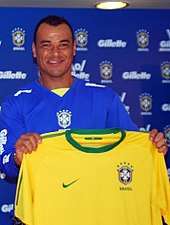
| # | Name | Caps | Goals | First cap | Latest cap |
|---|---|---|---|---|---|
| 1 | Cafu | 142 | 4 | 12 September 1990 | 1 July 2006 |
| 2 | Roberto Carlos | 125 | 11 | 26 February 1992 | 1 July 2006 |
| 3 | Dani Alves | 118 | 8 | 10 October 2006 | 13 October 2019 |
| 4 | Lúcio | 105 | 4 | 15 November 2000 | 5 September 2011 |
| 5 | Neymar | 101 | 61 | 10 August 2010 | 13 October 2019 |
| Cláudio Taffarel | 101 | 0 | 7 July 1988 | 12 July 1998 | |
| 7 | Robinho | 100 | 28 | 13 July 2003 | 25 January 2017 |
| 8 | Djalma Santos | 98 | 3 | 10 April 1952 | 9 June 1968 |
| Ronaldo | 98 | 62 | 23 March 1994 | 7 June 2011 | |
| 10 | Ronaldinho | 97 | 33 | 26 June 1999 | 24 April 2013 |
Top goalscorers
- As of 13 October 2019[5]
- Players in bold are still active, at least at club level.
| # | Name | Goals | Caps | Average | First cap | Latest cap | Position |
|---|---|---|---|---|---|---|---|
| 1 | Pelé (list) | 77 | 92 | 0.84 | 7 July 1957 | 18 July 1971 | FW |
| 2 | Ronaldo (list) | 62 | 98 | 0.63 | 23 March 1994 | 7 June 2011 | FW |
| 3 | Neymar (list) | 61 | 101 | 0.6 | 10 August 2010 | 13 October 2019 | FW |
| 4 | Romário (list) | 55 | 70 | 0.79 | 23 May 1987 | 27 April 2005 | FW |
| 5 | Zico (list) | 48 | 71 | 0.68 | 25 February 1976 | 21 June 1986 | MF |
| 6 | Bebeto (list) | 39 | 75 | 0.52 | 28 April 1985 | 12 July 1998 | FW |
| 7 | Rivaldo (list) | 35 | 74 | 0.47 | 16 December 1993 | 19 November 2003 | MF |
| 8 | Jairzinho (list) | 33 | 81 | 0.41 | 7 June 1964 | 3 March 1982 | FW |
| Ronaldinho (list) | 33 | 97 | 0.34 | 26 June 1999 | 24 April 2013 | MF | |
| 10 | Ademir | 32 | 39 | 0.82 | 21 January 1945 | 15 March 1953 | FW |
| Tostão (list) | 32 | 54 | 0.59 | 15 May 1966 | 9 July 1972 | FW |
Youngest goalscorer
- Pelé (16 years and nine months)[145]
Honours
Senior team
.jpg)
Official titles
- FIFA World Cup:
- FIFA Confederations Cup:
- South American Championship / Copa América:
- Panamerican Championship:
- Winners (2): 1952, 1956
- Runners-up: 1960
- CONCACAF Gold Cup:
Other awards
- FIFA Team of the Year:
- FIFA Fair Play Trophy:
- World Soccer Team of the Year
- Winners: 1982, 2002
Friendlies
- Taça Independência:
- Winners: 1972
- Taça do Atlântico:
- Winners (3): 1956, 1970, 1976[146]
- U.S.A. Bicentennial Cup Tournament:
- Winners: 1976
- Rous Cup:
- Winners: 1987
- Australia Bicentenary Gold Cup:
- Winners: 1988
- Umbro Cup:
- Winners: 1995
- Nelson Mandela Challenge:
- Winners: 1996
- Lunar New Year Cup:
- Winners: 2005
- Roca Cup / Superclásico de las Américas:
- Copa Río Branco:
- Winners (7): 1931, 1932, 1947, 1950, 1967, 1968, 1976
- Taça Oswaldo Cruz:
- Winners (8): 1950, 1955, 1956, 1958, 1961, 1962, 1968, 1976
Olympic and Pan American Team
- Summer Olympic Games:[147]
- Pan American Games:
- CONMEBOL Pre-Olympic Tournament:
- Winners (7): 1968, 1971, 1976, 1984, 1987, 1996, 2000
- Runners-up (2): 1964, 2020
- Third place (2): 1960, 2004
See also
- Brasil Global Tour
- Brazil national football team results (2010–19)
- Brazil national under-23 football team
- Brazil national under-20 football team
- Brazil national under-17 football team
- Brazil national futsal team
- Argentina–Brazil football rivalry
- Brazilian football songs
- Campeonato Brasileiro Série A
- List of Brazil national football team managers
References
Notes
Citations
- Alian brasileira/noticia/2016/06/tite-aceita-proposta-e-e-o-substituto-de-dunga-no-comando-da-selecao.html "Tite aceita proposta e é substituto de Dunga no comando da Seleção", globoesporte.com, 15 June 2016, Retrieved on 15 June 2016
- "Dani Alves será o capitão da Seleção nos amistosos e Copa América". Globoesporte.com. 27 May 2019. Archived from the original on 27 May 2019. Retrieved 27 May 2019.
- “FIFA Century Club”. FIFA. Retrieved 9 June 2018
- "Marcos Evangelista de Morais "CAFU" – Century of International Appearances". RSSSF. 23 July 2006. Archived from the original on 21 February 2009. Retrieved 23 January 2009.
- "Brazil – Record International Players". RSSSF. 7 November 2008. Retrieved 10 May 2009.
- "The FIFA/Coca-Cola World Ranking". FIFA. 16 July 2020. Retrieved 16 July 2020.
- 23 September 1993 until 19 November 1993, 19 April 1994 until 14 June 1994, 21 July 1994 until 16 May 2001, 3 July 2002 until 14 February 2007, 18 July 2007 until 19 September 2007, 1 July 2009 until 20 November 2009, 28 April 2010 until 14 July 2010, 6 April 2017
- "Argentina versus Brazil". FIFA.com (Fédération Internationale de Football Association). Retrieved 5 January 2009.
- "Brazil matches, ratings and points exchanged". Eloratings.net. Retrieved 3 August 2014.
- "Soccer World Cup All-Time Standings". Thesoccerworldcups.com. Retrieved 3 August 2014.
- All-time table of the FIFA World Cup
- Brazil at the FIFA World Cup
- Team of the Year Award 2010 Archived 18 December 2010 at the Wayback Machine on the FIFA website
- "Beckenbauer diz que Brasil de 1970 foi melhor seleção de todos os tempos". Beckenbauer diz que Brasil de 1970 foi melhor seleção de todos os tempos. Gazeta do Povo. Archived from the original on 13 November 2014. Retrieved 1 July 2013.
- Pitt-Brooke, Jack (3 July 2012). "The greatest team of all time: Brazil 1970 v Spain 2012". The Independent. London: The Independent. Retrieved 1 July 2013.
- "10 Greatest National Teams in World Football History". Bleacher Report. Retrieved 2 January 2018.
- Lea, Greg. "The Best Ever International Teams: Part Two". betsson.com. Retrieved 2 January 2018.
- "The 30 greatest international teams of all time". The Football Pantheon. Retrieved 14 July 2014.
- "Soccer great Zico: Brazil '58 best team ever". Zico. CNN. 5 July 2012. Retrieved 1 July 2013.
- "Phenomenal goals, silky skills and tight blue shorts – Why Brazil 1982 was the best World Cup team ever". Mirror.co.uk. Retrieved 14 July 2014.
- "World Cup: The 10 best teams of all times". LA Times. Retrieved 2 January 2018.
- "Euro 2016: Which is the greatest team in history of international football?". BBC. Retrieved 2 January 2018.
- "Spain win again to extend unbeaten streak". CNN. 20 June 2009. Retrieved 8 August 2014.
- víctor pérez. "Brasil-Italia, el clásico del fútbol mundial que consagró el viejo Sarriá". ABC.es.
- Molinaro, John (20 June 2009). "World Derby: Brazil vs Italy". CBC Sports. Retrieved 16 October 2018.
- "FIFA U-20 World Cup 2015 - News - Brazil & Uruguay, a rivalry with history - FIFA.com". www.fifa.com.
- Brazil and France shares 85-year-rivalry and four World Cups
- Salgado, Diego (9 July 2014). "Brazil and Netherlands face each other for the fifth time in World Cups" – via www.exame.com.
- "The birth of a revolution". FIFA.com. 1 July 2008. Archived from the original on 4 November 2012. Retrieved 19 February 2009.
- Dart, Tom (15 May 2009). "Magic of Brazil comes to a corner of Devon". The Times. London.
- Bellos, Alex (31 May 2004). "Grecians paved way despite kick in teeth". The Guardian. London os. Retrieved 15 May 2009.
- Bellos, Alex (2002). Futebol: the Brazilian way of life. London: Bloomsbury. p. 37. ISBN 0-7475-6179-6.
- "Exeter fix dream date against Brazil". The Daily Telegraph. London. 23 April 2004. Retrieved 20 May 2009.
- Demetriou, Danielle (31 May 2004). "Brazil's past masters out-samba Exeter in 90-year rematch". The Independent. London. Retrieved 20 May 2009.
- "Seleção Brasileira 1914–1922".
- Glanville, Brian (2005). The Story of the World Cup. London: Faber and Faber. p. 19
- Oliver, Guy (1992). The Guinness Record of World Soccer. Guinness Publishing. p. 560.
- "Ghosts of Uruguay's 1950 World Cup upset still haunt some in Brazil". The Washington Post. Retrieved 11 July 2014.
- "World Cup and U.S. soccer history: 1950–1970". USA Today. 9 May 2006. Retrieved 12 February 2009.
- Garrincha 122.
- Pelé (13 May 2006). "How a teenager took the world by wizardry". The Guardian. Retrieved 16 July 2017.
- "FIFA Classic Player". FIFA.com. 23 October 1940. Retrieved 11 August 2012.
- "PELE – International Football Hall of Fame". Ifhof.com. 23 October 1940. Retrieved 11 August 2012.
- Krishnan, Joe (18 June 2014). "World Cup 2014: Spain and the World Cup holders who crashed out at the group stage". The Independent. Retrieved 18 April 2015.
- "PELE – International Football Hall of Fame". ifhof.com. Archived from the original on 3 March 2016. Retrieved 16 August 2016.
- "Boring, boring Brazil? Why the Seleção's 1994 winners were unloved back home". FourFourTwo. Retrieved 14 January 2020.
- "Brazil not too comfortable as World Cup favorite". USA Today. 23 May 2006. Retrieved 12 February 2009.
- "World Cup 1990".ESPN. Retrieved 9 June 2018
- "1994 Brazil winning team". FIFA. 9 June 2018.
- "The great World Cup Final mystery". BBC Sport. British Broadcasting Corporation. 2 April 2002. Retrieved 10 June 2018.
- "World Cup: 25 stunning moments … No15: Ronaldo falters as France win". The Guardian. Retrieved 10 June 2018
- "Brazil end England's dream". BBC Sport. Retrieved 14 January 2020
- "Brazil crowned world champions". BBC Sport. 30 June 2002. Retrieved 22 August 2009.
- "Redemption for Ronaldo as world's eyes turn east". FIFA.com. Retrieved 9 June 2018
- "Laureus World Team of the Year 2003 nominees". Laureus. Archived from the original on 24 October 2017. Retrieved 24 October 2017.
- "Brazil 2–2 Argentina: Shoot-out drama". ESPNsoccernet. 26 July 2004. Retrieved 5 January 2009.
- "Brazil 4–1 Argentina: Adriano stars". ESPNsoccernet. 29 June 2005. Retrieved 5 January 2009.
- Vickery, Tim (18 December 2017). "Kaka's spectacular run with Milan and Brazil overshadowed by his successors". ESPN.
- "Dunga completa dois anos na seleção garantindo ser um desafio ganhar o ouro". Globo Esporte (in Portuguese). 24 July 2009. Retrieved 5 January 2009.
- Dawkes, Phil (28 June 2009). "USA 2–3 Brazil". BBC Sport. Retrieved 28 June 2009.
- "FIFA Confederations Cup South Africa 2009 | Awards". FIFA.com. Fédération Internationale de Football Association (FIFA). Retrieved 20 October 2017.
- Bevan, Chris (2 July 2010). "Netherlands 2–1 Brazil: The Netherlands produced a stunning second-half comeback to reach the semi-finals as Brazil's World Cup imploded in a dramatic game in Port Elizabeth". BBC Sport. Retrieved 12 March 2015.
- "Brazil name Dunga's replacement as they rebuild for the next World Cup". The Guardian. London: Guardian Media Group. Press Association. 24 July 2010. Retrieved 26 July 2010.
- "Mano Menezes sacked as Brazil coach". Goal.com. 23 November 2012. Retrieved 23 November 2012.
- "Felipão é o novo técnico da Seleção, e Andrés deixa cargo na CBF" (in Portuguese). Globoesporte.com. 28 November 2012. Retrieved 28 November 2012.
- "Netherlands go fifth in Fifa ranking". Goal.com. 6 June 2013. Retrieved 6 June 2013.
- "Brazil-Spain: a showdown 27 years in the making". Marca. 28 June 2013. Retrieved 1 July 2013.
- "Fred and Neymar claim Confeds for Brazil". FIFA.com. 1 July 2013. Archived from the original on 2 July 2013. Retrieved 1 July 2013.
- "Brazil defeats Spain to win Confederations Cup". CBC. 30 June 2013. Retrieved 1 July 2013.
- "Neymar breaks through for top award". FIFA.com. 1 July 2013. Retrieved 1 July 2013.
- "Brazil 3–1 Croatia". BBC Sport. 12 June 2014. Retrieved 9 July 2014.
- "Cameroon 1–4 Brazil". BBC. 23 June 2014. Retrieved 9 July 2014.
- "Brazil 0–0 Mexico". FIFA.com. 17 June 2014. Retrieved 9 July 2014.
- Ornstein, David (28 June 2014). "Brazil 1–1 Chile". BBC Sport. Retrieved 9 July 2014.
- "Neymar: Injured Brazil forward ruled out of World Cup". BBC Sport. 4 July 2014. Retrieved 5 July 2014.
- "World Cup 2014: Brazil fail to have Thiago Silva booking rescinded". BBC Sport. 7 July 2014. Retrieved 9 July 2014.
- "The greatest half-hour in World Cup history?". Eurosport. 9 July 2014. Archived from the original on 14 July 2014. Retrieved 9 July 2014.
- "Brazil 1–7 Germany: World Cup 2014 semi-final – as it happened". The Guardian. 9 July 2014. Retrieved 9 July 2014.
- "Maracanazo foi trágico, 'Minerazo', a maior vergonha do Brasil". ESPN. 8 July 2014. Retrieved 11 July 2014.
- Heta, Marco (18 March 2018). "Neymar and the magical influence of an enigmatic amulet". Football Paradise. Retrieved 18 March 2018.
For the Brazilians, the disappointment was too much to cope with. Canarinho subsequently dropped to fourth place as Holland cruised to a relatively comfortable 3–0 victory in the third place play-off at Estádio Nacional.
- "Brazil 0–3 Netherlands". BBC. 12 July 2014. Retrieved 13 June 2014.
- "2014 FIFA World Cup Brazil™ – Statistics – Teams – Top goals – FIFA.com". FIFA.com. Retrieved 13 June 2014.
- "Netherlands ensure miserable end for hosts". ESPN.co.uk. Retrieved 13 July 2014.
- https://www.theguardian.com/football/2014/jul/14/luiz-filipe-scolari-resigns-brazil-world-cup-2014
- "Dunga sends Brazil back to the future". Goal.com. 22 July 2014. Retrieved 22 July 2014.
- "Brazil 1–0 Colombia". BBC Sports. 6 September 2014. Retrieved 21 October 2014.
- "Brazil 1–0 Ecuador". BBC Sports. 10 September 2014. Retrieved 21 October 2014.
- "Argentina 0–2 Brazil". BBC Sports. 11 October 2014. Retrieved 21 October 2014.
- "Japan 0–4 Brazil". BBC Sports. 14 October 2014. Retrieved 21 October 2014.
- "Turkey 0–4 Brazil". BBC Sport. 12 November 2014. Retrieved 6 March 2015.
- "International friendly: Brazil score late on to sink Austria 2–1 in Vienna". SkySports. 19 November 2014. Retrieved 6 March 2015.
- "Brazil 2–1 Peru: Douglas Costa wins it late for Selecao". Goal.com. 15 June 2015. Retrieved 30 June 2015.
- "Brazil 0–1 Colombia: Murillo shocks struggling Selecao". Goal.com. 18 June 2015. Retrieved 30 June 2015.
- "VIDEO HIGHLIGHTS: Brazil 2–1 Venezuela: Thiago Silva and Firmino seal top spot". Goal.com. 21 June 2015. Retrieved 30 June 2015.
- "Brazil 1–1 Paraguay (3–4 on pens): Selecao dumped out of Copa America". Goal.com. 28 June 2015. Retrieved 30 June 2015.
- "Brasil fica fora da Copa das Confederações após 20 anos" (in Portuguese). Terra. 27 June 2015. Retrieved 30 June 2015.
- Adams, Jonathan (5 June 2016). "Who Won the Brazil vs. Ecuador Match in Copa America?".
- "Liverpool's Philippe Coutinho scores hat-trick for Brazil". BBC Sport. 8 June 2016. Retrieved 9 June 2016.
- Wiener, David. "Brazil v Peru: Raul Ruidiaz scores controversial goal that eliminates Dunga's side from Copa America". Fox Sports Australia. News Corporation. Retrieved 13 June 2016.
- "Dunga says 'everyone saw' Ruidiaz's handball on Peru winner vs. Brazil". ESPN FC. ESPN. Retrieved 13 June 2016.
- "Brazil knocked out of Copa America by Peru thanks to 'handball' goal". The Telegraph. Retrieved 13 June 2016.
- "Brazil dumped out of Copa America by lowly Peru for earliest exit since 1987". Independent.ie. Retrieved 13 June 2016.
- "Brazil exits Copa America after blatant handball goal". Herald Sun. News Corporation. Retrieved 13 June 2016.
- Edwards, Daniel (14 June 2016). "Dunga sacked as Brazil coach". Goal.com. Retrieved 14 June 2016.
- Reuters (20 June 2016). "Brazil confirm appointment of Tite as new coach to replace Dunga". The Guardian. Guardian News and Media Limited. Retrieved 28 June 2016.
- PA Sport (2 September 2016). "Ecuador 0–3 Brazil: Gabriel Jesus scores twice on full international debut". SkySports. Sky UK. Retrieved 10 October 2016.
- Staff (6 April 2017). "Brazil top FIFA rankings for first time in seven years". Reuters. Zurich. Retrieved 5 June 2017.
- "World Cup qualifying: Brazil beat Paraguay to seal place in Russia". BBC Sport. BBC. 29 March 2017. Retrieved 29 March 2017.
- Peterson, Joel (17 June 2018). "For Brazil, a Disappointing Start to World Cup". The New York Times. The New York Times Company. Retrieved 17 June 2018.
- "Brazil 2–0 Costa Rica". FIFA. 22 June 2018. Retrieved 22 June 2018.
- "Brazil 2–0 Serbia". FIFA.com. 3 July 2018.
- "Brazil beat Mexico to reach last 8". BBC. 2 July 2018. Retrieved 2 July 2018.
- Johnston, Neil (6 July 2018). "World Cup 2018: Belgium produce masterclass to knock out Brazil with 2–1 win". BBC Sport. BBC. Retrieved 7 July 2018.
- Rogers, Martin (6 July 2018). "Brazil is no longer the class of world soccer". USA Today. Gannett. Retrieved 7 July 2018.
- Wiggins, Brandon (6 July 2018). "Brazil, the overwhelming favorite to win the World Cup, has been knocked out, and now the tournament is wide open". Business Insider. Axel Springer. Retrieved 7 July 2018.
- sport, Guardian (6 June 2019). "Brazil's Neymar ruled out of Copa América with ankle injury" – via www.theguardian.com.
- "Brazil 3-0 Bolivia: Copa America: Brazil fans jeer hosts despite Coutinho brace in 3-0 win". 15 June 2019 – via www.bbc.com.
- "Samba swagger returns for Brazil as they put five past Peru". AS.com. 22 June 2019.
- "Brazil vs. Venezuela - Football Match Report - June 18, 2019 - ESPN". ESPN.com.
- "Copa America: Brazil beat Paraguay on penalties to reach semi-finals". 28 June 2019 – via www.bbc.co.uk.
- "Brazil 2-0 Argentina | Copa América semi-final match report". 3 July 2019 – via www.theguardian.com.
- "Copa America 2019: Brazil beat Peru 3-1 to win first title in 12 years". 7 July 2019 – via www.bbc.com.
- Meda, Tomás Pavel Ibarra (5 July 2019). "Scaloni still thinks Argentina was robbed by Conmebol". Ronaldo.com.
- "Fernando Pieruccetti creates the Canarinhos". Terra. Retrieved 6 October 2006.
- "Reference to Pentacampeão". BBC Brasil. Retrieved 6 October 2006.
- "Reference to the Scratch". Guilherme Soares.
- Futebol, p64
- Ibid
- "Topper 1991 Brazil Match Worn Home Shirt". footballshirtculture.com. Football Shirt Culture. 3 January 2018. Retrieved 3 February 2018.
- "FIFA World Cup 1998 Group A". historicalkits.co.uk. Historical Football Kits. Retrieved 3 February 2018.
- Futebol, p67
- "Adidas, Topper, Umbro e Nike: todas as camisas da seleção desde 1977". Placar. 11 October 2013. Archived from the original on 5 March 2016. Retrieved 12 July 2014.
- "Most Valuable National Football Team Kit Deals". TOTAL SPORTEK. 2 September 2016.
- "Brazil's national team begins preparations for World Cup at home amid protests - World - Coast Reporter". 29 May 2014. Archived from the original on 29 May 2014.
- "Brazil's Team Base Camp Granja Comary is reopened". www.copa2014.gov.br. Archived from the original on 29 May 2014. Retrieved 29 May 2014.
- "Head-to-Head Search". FIFA. 5 February 2009. Retrieved 22 April 2009.
- "Compare Teams BRA–GER". FIFA. Retrieved 14 November 2015.
- "Compare Teams BRA–SRB". FIFA. Retrieved 14 November 2015.
- "Compare Teams BRA–CZE". FIFA. Retrieved 14 November 2015.
- "Compare Teams BRA–RUS". FIFA. Retrieved 14 November 2015.
- "East Germany – International Results". RSSSF. Retrieved 14 November 2015.
- "Panamerican Games 1975". RSSSF. Retrieved 14 November 2015.
- "Compare Teams BRA–COD". FIFA. Retrieved 14 November 2015.
- "Seleção Brasileira convocada para a primeira rodada das Eliminatórias" (in Portuguese). CBF. 6 March 2020. Retrieved 16 March 2020.
- Lang, Jack (7 July 2017). "60 years ago today, Pele scored his first Brazil goal and began a career that would change football". The Independent. Retrieved 29 July 2018.
- "Sala de Troféus da CBF" (in Portuguese). Confederação Brasileira de Futebol (CBF). Archived from the original on 6 January 2009. Retrieved 5 January 2009.
- Since 1992, squads for Football at the Summer Olympics have been restricted to three players over the age of 23. The achievements of such teams are not usually included in the statistics of the international team.
Sources
- Ruy Castro, Andrew Downie (translator) (2005). Garrincha – The triumph and tragedy of Brazil's forgotten footballing hero. Yellow Jersey Press, London. ISBN 0-224-06433-9.
- Ivan Soter (2015). Enciclopédia da Seleção:100 anos de seleção brasileira de futebol. Folha Seca, Rio de Janeiro. ISBN 978-85-87199-29-4.
External links
| Wikimedia Commons has media related to Brazil national association football team. |
